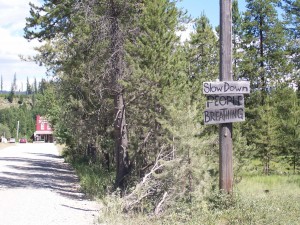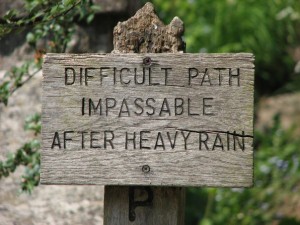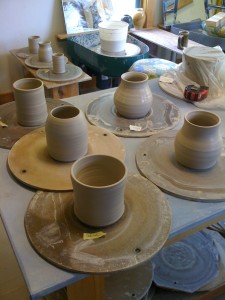
Sometimes when I’m trying to print a form or a document with special lay-out features, the computer will ask me if I’m sure about that, since it will mean printing into the established margins. I always say “yes” to this question: I want to fit it onto one page or I like the way it looks with less white space at the edges. The problem is, I do this in the rest of my life, too.
I recently read MaryAnn McKibben Dana’s excellent book Sabbath in the Suburbs, a reflection on her family’s year of observing a weekly Sabbath. One of the things she learned to do during that year is to take something off the list. When she embarks on the new day with the to-do list loaded and ready to go, she looks it over and purposely, in advance, without regret or bargaining, takes one thing off. She intentionally chooses to leave something undone – before she’s even gotten into the day.
At a clergy gathering last year we listened to a speaker who was there to help us “manage time” and organize ourselves better. The most helpful thing he did was urge us not to schedule every moment of the day. I struggle with this.
And yet, when I look at the calendar and lists for the day ahead and I see more than I can do and appointments on the hour all day long, I feel discouraged before I start. I feel like I am taking as big a breath as my lungs can handle and then trying to swim laps without taking another breath. Until I can’t anymore. The problem with this (in addition to the running out of air and gasping and dying part of that image) is that this type of scheduling leaves no room. There is no room for mistakes or changing my mind or something unexpected. There is no room to reflect on that amazing conversation I was privileged to have with a student, no room to absorb all that is keeping me so busy.
There is a strange loneliness in rushing. It’s easy to slip across the surface of a frantically-scheduled day and come to the end of it with only a checked-off checklist. In the margins, there is room to connect – to myself, others, and God – without goals and agendas intruding. A quiet morning moment on the porch, sipping an evening glass of wine, time to walk around the block between meetings, an hour with nothing “to do,” a Saturday without a schedule – margins. Space for the unknown, for inspiration. A margin makes room for the fullness of resonance.
The best days are the ones that feel full enough. Not harried and overflowing and breathless, just full. With plenty going on but also a little room to breathe. Space between this moment and the next. Space intentionally not filled up, like the white space around the print on a page. The margin you leave for error – or wonder.
On this snowy morning I am starting the day with a long list. I don’t know what I will intentionally take off the list but I’m going to try to find one thing. I’m going to tell that crazy computer mind of mine “no” this time. No, don’t print there. Maintain the margins.

 At a recent clergy event the workshop leader asked us talk about what gets in the way in pastoral care situations. When you are trying to offer or articulate hope to someone, what gets in the way for you?
At a recent clergy event the workshop leader asked us talk about what gets in the way in pastoral care situations. When you are trying to offer or articulate hope to someone, what gets in the way for you?  I traveled solo for a long time. Single, with friends and family all over the globe and a love of the road, meant I developed habits to keep me safe, on schedule, traveling light, and unnoticed.
I traveled solo for a long time. Single, with friends and family all over the globe and a love of the road, meant I developed habits to keep me safe, on schedule, traveling light, and unnoticed. I’ve been thinking about Ash Wednesday a little differently this year as I’ve worked on the liturgy and prepared myself to say to people, one after the other, “Remember you are dust, and to dust you shall return.” I blame it on the pottery classes I’ve been taking.
I’ve been thinking about Ash Wednesday a little differently this year as I’ve worked on the liturgy and prepared myself to say to people, one after the other, “Remember you are dust, and to dust you shall return.” I blame it on the pottery classes I’ve been taking. Maybe it’s my winter birthday but I’ve always loved a snow day. The world muffled and blanketed. Cancellations and sleeping in. Calendars and clocks taking a back seat for the day.
Maybe it’s my winter birthday but I’ve always loved a snow day. The world muffled and blanketed. Cancellations and sleeping in. Calendars and clocks taking a back seat for the day.